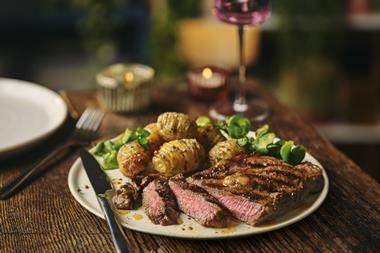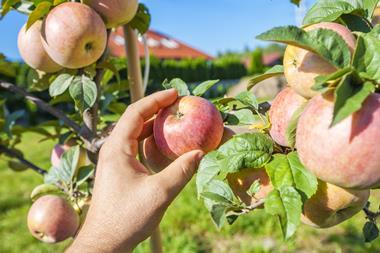Chileans are excited about the future of food and drink exports - and the UK is becoming an increasingly important target market. Liz Hamson reports
Flying into Santiago on an overcast spring day in late September is not a rewarding experience. After you’ve stomached the inevitable turbulence of descent over the Andes, you are greeted as you land by a leaden sky that obscures the mountain range to such a degree that you might as well be landing back at Heathrow.
It doesn’t get much better when you leave the airport terminal. If you’re after something typically South American, forget it. The people look European. They drive the same cars - on just as congested roads. To top it off, the capital has all the characteristics of an affluent Spanish city rather than anything that looks discernibly South American. It’s all pretty uninspiring.
And then the sun comes out and transforms everything.
Nowhere can first impressions be as misleading as in Chile, the strip of land 2,672 miles long and 68 miles wide that separates South America from the Pacific.
Its climate ranges from arid desert conditions in the north to the Antarctic conditions of Chilean Patagonia in the south. But it is in the fertile Central Valley, with its temperate climate, influenced on the one hand by Andean breezes and on the other by the cold Humboldt current running along the coast, that much of the food and drink is produced for export. And the UK is becoming an increasingly important target market for those exports.
There’s wine, its biggest food and drink export by some margin. Thanks to its southern hemisphere location, Chile has also capitalised on a harvest that kicks off in earnest as ours ends, supplying us with table grapes, apples, poultry and citrus fruits. Walnuts too are proving a successful export, as are avocados and this year’s ‘zero to hero’ fresh produce, blueberries.
It’s little wonder that the traditionally conservative Chileans are excited about the future. Luis Montero, commercial attaché at ProChile, Chile’s export promotion bureau at the Embassy of Chile in London, says: “We’ve been promoting our food for the past 15 to 20 years, but because we had scarce funds, it’s mainly been through the distribution channel than directly to the final consumer.”
However, it has allocated more money to food over the past five years and two producer associations now have offices in the UK - the Chilean exporters association, Asoex, and Wines of Chile.
Both have made a noticeable impact, says Montero, highlighting the correlation between the sudden growth in demand for Chilean wines and the relaunch of Wines of Chile under Michael Cox in 2003.
“It helps that traditionally we’ve had very good trade relations with the UK. It’s very productive and positive,” he adds.
Cox adds: “The encouraging thing about Chile is the tremendous spirit of optimism since democracy came in 1989. Not only has it got a stable democratic system, it’s also had constant economic growth, fuelled by copper prices, which are now as high as they’ve every been.”
As far as the country’s export market as a whole goes, there are two key priorities, says ProChile: to show supermarket buyers that Chilean products are not just high quality, but that the outfits that produce them are professional and innovative; and to educate consumers. The good news is that buyers are taking Chile more seriously, says Cristián López, commercial assistant at ProChile. “Every time a supermarket buyer visits Chile, they try new wines and see the new technology and the serious way we are working.”
The UK supermarkets were first to send scouting groups to the country, according Ronald Bown, chairman of the board at Asoex. In September, a team from Tesco had done the rounds in Chile - visiting fruit and vegetable producers, packing plants, nurseries and exporters. A Sainsbury delegation also visited earlier in the year.
There’s still a long way to go, however, says Christian Carvajal, marketing manager for Europe and Asia at Asoex: “We’ve only been doing promotions in Europe for six or seven years. You have to direct your first efforts at the trade so they understand and know what Chile is all about. Ten years ago, there was no image of Chile. A year ago, a study ranked us very highly. But we haven’t finished that first stage yet.“
Even so, attention is now beginning to turn to the second priority: getting the message across to consumers. Most of the major supermarkets are heavily promoting Chilean wine and fresh produce, with input from the likes of ProChile and Asoex.
Next year ProChile hopes to work in a joint venture with Chile’s Tourism Promotion Corporation to promote the country as a tourist destination. For Montero, disabusing people of the idea that Chile is a backward nation with an unsavoury tolerance of former dictators is vital. “People still think of Augusto Pinochet,” he says. “One of the main efforts we’ve been involved in is an information campaign to help exports and create awareness of what modern Chile is like.”
The more UK consumers understand Chile’s landscape, people and produce, says Montero, the more potential there is for its market share in the UK to grow even further. It is already the 15th biggest exporter to the UK after doubling its exports in the past decade. Who knows where it will be in 10 years’ time?
Flying into Santiago on an overcast spring day in late September is not a rewarding experience. After you’ve stomached the inevitable turbulence of descent over the Andes, you are greeted as you land by a leaden sky that obscures the mountain range to such a degree that you might as well be landing back at Heathrow.
It doesn’t get much better when you leave the airport terminal. If you’re after something typically South American, forget it. The people look European. They drive the same cars - on just as congested roads. To top it off, the capital has all the characteristics of an affluent Spanish city rather than anything that looks discernibly South American. It’s all pretty uninspiring.
And then the sun comes out and transforms everything.
Nowhere can first impressions be as misleading as in Chile, the strip of land 2,672 miles long and 68 miles wide that separates South America from the Pacific.
Its climate ranges from arid desert conditions in the north to the Antarctic conditions of Chilean Patagonia in the south. But it is in the fertile Central Valley, with its temperate climate, influenced on the one hand by Andean breezes and on the other by the cold Humboldt current running along the coast, that much of the food and drink is produced for export. And the UK is becoming an increasingly important target market for those exports.
There’s wine, its biggest food and drink export by some margin. Thanks to its southern hemisphere location, Chile has also capitalised on a harvest that kicks off in earnest as ours ends, supplying us with table grapes, apples, poultry and citrus fruits. Walnuts too are proving a successful export, as are avocados and this year’s ‘zero to hero’ fresh produce, blueberries.
It’s little wonder that the traditionally conservative Chileans are excited about the future. Luis Montero, commercial attaché at ProChile, Chile’s export promotion bureau at the Embassy of Chile in London, says: “We’ve been promoting our food for the past 15 to 20 years, but because we had scarce funds, it’s mainly been through the distribution channel than directly to the final consumer.”
However, it has allocated more money to food over the past five years and two producer associations now have offices in the UK - the Chilean exporters association, Asoex, and Wines of Chile.
Both have made a noticeable impact, says Montero, highlighting the correlation between the sudden growth in demand for Chilean wines and the relaunch of Wines of Chile under Michael Cox in 2003.
“It helps that traditionally we’ve had very good trade relations with the UK. It’s very productive and positive,” he adds.
Cox adds: “The encouraging thing about Chile is the tremendous spirit of optimism since democracy came in 1989. Not only has it got a stable democratic system, it’s also had constant economic growth, fuelled by copper prices, which are now as high as they’ve every been.”
As far as the country’s export market as a whole goes, there are two key priorities, says ProChile: to show supermarket buyers that Chilean products are not just high quality, but that the outfits that produce them are professional and innovative; and to educate consumers. The good news is that buyers are taking Chile more seriously, says Cristián López, commercial assistant at ProChile. “Every time a supermarket buyer visits Chile, they try new wines and see the new technology and the serious way we are working.”
The UK supermarkets were first to send scouting groups to the country, according Ronald Bown, chairman of the board at Asoex. In September, a team from Tesco had done the rounds in Chile - visiting fruit and vegetable producers, packing plants, nurseries and exporters. A Sainsbury delegation also visited earlier in the year.
There’s still a long way to go, however, says Christian Carvajal, marketing manager for Europe and Asia at Asoex: “We’ve only been doing promotions in Europe for six or seven years. You have to direct your first efforts at the trade so they understand and know what Chile is all about. Ten years ago, there was no image of Chile. A year ago, a study ranked us very highly. But we haven’t finished that first stage yet.“
Even so, attention is now beginning to turn to the second priority: getting the message across to consumers. Most of the major supermarkets are heavily promoting Chilean wine and fresh produce, with input from the likes of ProChile and Asoex.
Next year ProChile hopes to work in a joint venture with Chile’s Tourism Promotion Corporation to promote the country as a tourist destination. For Montero, disabusing people of the idea that Chile is a backward nation with an unsavoury tolerance of former dictators is vital. “People still think of Augusto Pinochet,” he says. “One of the main efforts we’ve been involved in is an information campaign to help exports and create awareness of what modern Chile is like.”
The more UK consumers understand Chile’s landscape, people and produce, says Montero, the more potential there is for its market share in the UK to grow even further. It is already the 15th biggest exporter to the UK after doubling its exports in the past decade. Who knows where it will be in 10 years’ time?

















No comments yet